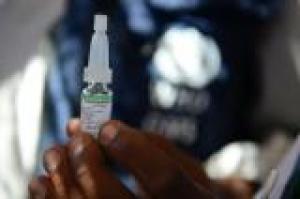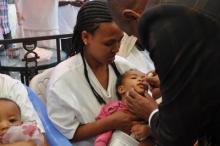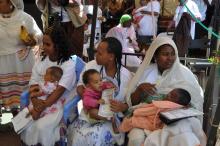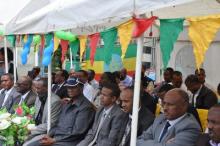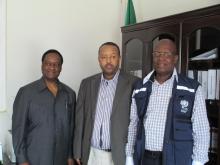Protecting Progress towards Polio Eradication
WHO Declares Polio Spread Public Health Emergency of International Concern.
On 5 May 2014, WHO declared the spread of wild poliovirus as a “public health emergency of international concern,” and issued Temporary Recommendations under the International Health Regulations (2005) to prevent further spread of the disease. It is only the second time in the history of the organization that such a declaration is being made, the first being during the swine flu pandemic of 2009.
The current wild polio outbreak affecting the Horn of Africa began in Somalia in May 2013. The first imported polio case was confirmed in Ethiopia in August 2013; the onset of the most recent tenth case was on 5 January 2014. Since the beginning of the outbreak, the Federal Ministry of Health, supported by WHO, UNICEF, Bill and Melinda Gates Foundation, USAID, CDC, CORE GROUP, DFID, GAVI Alliance and Rotary, have conducted two rounds of national immunization days (NIDs), as well as several sub-national supplementary immunization activities (SIAs) to ensure fast and aggressive interruption of wild polio virus transmission in Ethiopia.
As we enter the high transmission season for wild poliovirus, the priority for Ethiopia will be to continue the full application of the polio eradication strategies to interrupt wild poliovirus transmission within its borders as rapidly as possible, through supplementary immunization campaigns with oral poliovirus vaccine (OPV), surveillance for poliovirus, and routine immunization. In addition, special strategies initiated in response to the outbreak in Somali Region, such as cross border and transit point vaccinations, and community based surveillance, will need to be further strengthened and sustained.
WHO recommendation for Ethiopia, as a country which currently has wild poliovirus but has not transmitted it to another country in the low-transmission season in 2014, is to:
- encourage residents and long-term visitors to receive an additional dose of oral polio vaccine (OPV) or injectable polio vaccine (IPV) 4 weeks to 12 months prior to each international journey; those undertaking urgent travel (less than 4 weeks’ notice) who have not been vaccinated with a dose polio vaccine within the previous 4 weeks to 12 months should be encouraged to receive a dose by the time of departure;
- ensure travelers have access to an appropriate document to record their polio vaccination status;
- maintain these measures until at least 6 months have passed without the detection of wild poliovirus transmission in the country from any source.
In response to the recommendations, the Federal Ministry of Health has made polio vaccines along with proof of vaccination available for travelers at the Black Lion Hospital travelers' vaccination center in Addis Ababa. WHO continues to support Ethiopia together with partners to kick polio out of the country. WHO has supported a surge in technical staff to the outbreak zone and Somali Region in general focusing on implementing high quality SIAs, integration of routine EPI strengthening, intensifying support to the high risk woredas and on strengthening community-level surveillance and social mobilization networks. The Somali Regional Health Bureau and WHO also established a sub-regional command post in Dolo Zone, which is the epicentre of the outbreak, on 15 April for improved coordination of the outbreak response.
For more information, please contact Dr Fiona Braka, Maternal, Child Health and Nutrition Cluster Coordinator, WHO Ethiopia; email: brakaf [at] who.int (brakaf[at]who[dot]int)
PHOTOS: WHO Ethiopia/ Viivi Erkkila & Loza Mesfin Tesfaye



